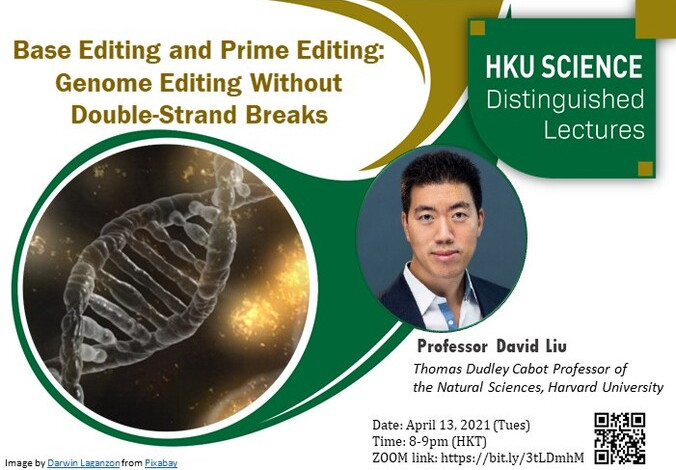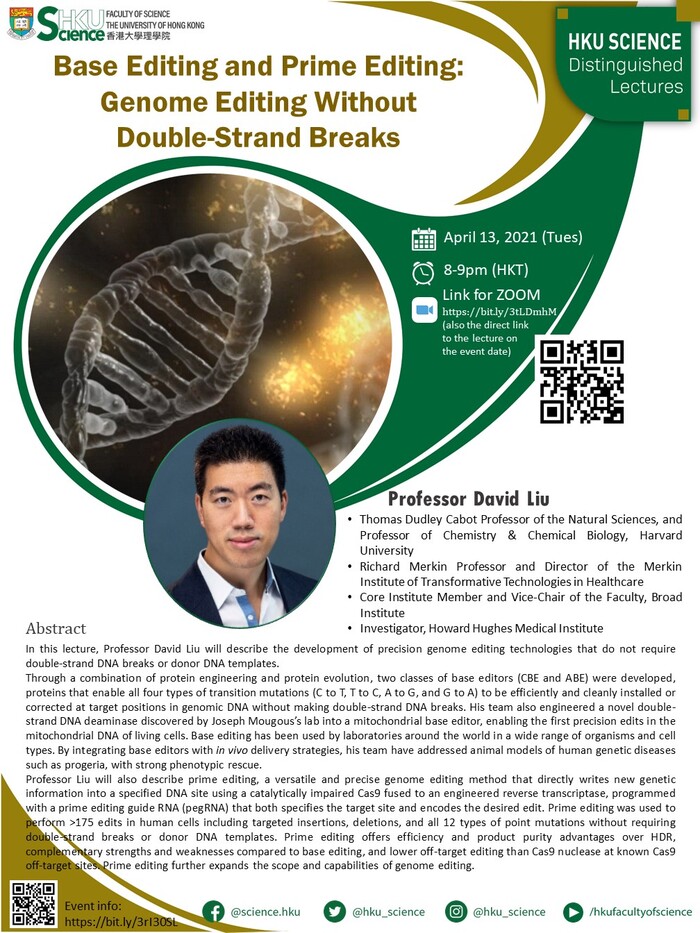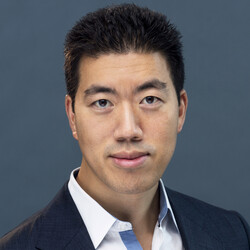Distinguished Lecture - Base Editing and Prime Editing: Genome Editing Without Double-Strand Breaks

- Date & Time
- April 13, 2021 (Tues) | 8-9pm (HKT)
- Venue
- ZOOM online lecture (https://bit.ly/3tLDmhM)
- Speaker
- Professor David Liu
Thomas Dudley Cabot Professor of the Natural Sciences, and Professor of Chemistry & Chemical Biology, Harvard University

Abstract:
In this lecture Professor David Liu will describe the development of precision genome editing technologies that do not require double-strand DNA breaks or donor DNA templates.
Through a combination of protein engineering and protein evolution, his team developed two classes of base editors (CBE and ABE), proteins that enable all four types of transition mutations (C to T, T to C, A to G, and G to A) to be efficiently and cleanly installed or corrected at target positions in genomic DNA without making double-strand DNA breaks (Komor et al. Nature 2016; Gaudelli et al. Nature 2017). They also engineered a novel double-strand DNA deaminase discovered by Joseph Mougous’s lab into a mitochondrial base editor, enabling the first precision edits in the mitochondrial DNA of living cells (Mok et al. Nature 2020). Base editing has been used by laboratories around the world in a wide range of organisms and cell types. By integrating base editors with in vivo delivery strategies, they have addressed animal models of human genetic diseases such as progeria, with strong phenotypic rescue (Koblan et al. Nature 2021).
Professor Liu will also describe prime editing, a versatile and precise genome editing method that directly writes new genetic information into a specified DNA site using a catalytically impaired Cas9 fused to an engineered reverse transcriptase, programmed with a prime editing guide RNA (pegRNA) that both specifies the target site and encodes the desired edit (Anzalone et al. Nature 2019). His team used prime editing to perform >175 edits in human cells including targeted insertions, deletions, and all 12 types of point mutations without requiring double-strand breaks or donor DNA templates. Prime editing offers efficiency and product purity advantages over HDR, complementary strengths and weaknesses compared to base editing, and lower off-target editing than Cas9 nuclease at known Cas9 off-target sites. Prime editing further expands the scope and capabilities of genome editing.
Links to publications cited above:
118. Programmable Editing of a Target Base in Genomic DNA Without Double-Stranded DNA Cleavage. Komor, A. C.; Kim, Y. B.; Packer, M. S.; Zuris, J. A.; Liu, D. R. Nature 533, 420-424 (2016). PDF, SI, Expanded Extended Data Figure 6
133. Programmable Base Editing of A*T to G*C in Genomic DNA Without DNA Cleavage. Gaudelli, N. M.; Komor, A. C.; Rees, H. A.; Packer, M. S.; Badran, A. H.; Bryson, D. I.; Liu, D. R. Nature 551, 464-471 (2017). PDF, SI
178. A Bacterial Cytidine Deaminase Toxin Enables CRISPR-Free Mitochondrial Base Editing. Mok, B. Y; de Moraes, M. H; Zeng, J; Bosch, D. E; Kotrys, A. V; Raguram, A.; Hsu, F; Radley, M.C; Peterson, S. B; Mootha, V.K; Mougous, J.D; Liu, D. R. Nature. 583, 631-637 (2020). PDF, SI
182. In Vivo Adenine Base Editing Corrects Hutchinson-Gilford Progeria Syndrome. Koblan L. W.; Erdos, M. R.; Wilson, C.; Cabral, W. A.; Levy, J. M.; Xiong, Z.-M.; Taarez, U. L.; Davison, L.; Gete, Y. G.; Mao, X.; Newby, G. A.; Doherty, S. P.; Lin, C. Y.; Gordon, L. B.; Cao, K.; Collins, F. S.; Brown, J. D.; Liu, D. R. Nature in press, available online (2021). PDF
164. Search-and-replace genome editing without double-strand breaks or donor DNA. Anzalone, A.V.; Randolph, P.B.; Davis, J.R.; Sousa, A.A.; Koblan, L.W.; Levy, J.M.; Chen, P.J.; Wilson, C.; Newby, G.A.; Raguram, A.; Liu, D.R. Nature, 576, 149–157 (2019). PDF SI

Speaker Professor David Liu
Thomas Dudley Cabot Professor of the Natural Sciences, and Professor of Chemistry & Chemical Biology, Harvard University
Professor David R Liu is the Richard Merkin Professor, director of the Merkin Institute of Transformative Technologies in Healthcare, and vice chair of the faculty at the Broad Institute of Harvard and MIT; a professor of chemistry and chemical biology at Harvard University and a Howard Hughes Medical Institute (HHMI) investigator. Liu’s research integrates chemistry and evolution to illuminate biology and enable next-generation therapeutics. His major research interests include the engineering, evolution, and in vivo delivery of genome editing proteins such as base editors to study and treat genetic diseases; the evolution of proteins with novel therapeutic potential using phage-assisted continuous evolution (PACE); and the discovery of bioactive synthetic small molecules and synthetic polymers using DNA-templated organic synthesis and DNA-encoded libraries. Base editing (named one of four 2017 Breakthrough of the Year finalists by Science), prime editing, PACE, and DNA-templated synthesis are four examples of technologies pioneered in his laboratory. Liu graduated first in his class at Harvard in 1994. He performed organic and bioorganic chemistry research on sterol biosynthesis under Professor E. J. Corey’s guidance as an undergraduate. During his PhD research with Professor Peter Schultz at U. C. Berkeley, Liu initiated the first general effort to expand the genetic code in living cells. He earned his Ph.D. in 1999 and became assistant professor of chemistry and chemical biology at Harvard University in the same year. He was promoted to associate professor in 2003 and to full professor in 2005. Liu became a Howard Hughes Medical Institute investigator in 2005 and joined the JASONs, academic science advisors to the U.S. government, in 2009. Liu has been elected a member of the U.S. National Academy of Medicine and fellow of the American Association for the Advancement of Science. He has earned several university-wide distinctions for teaching at Harvard, including the Joseph R. Levenson Memorial Teaching Prize, the Roslyn Abramson Award, and a Harvard College Professorship. Liu has published more than 200 papers and is the inventor on more than 75 issued U.S. patents. His research accomplishments have earned distinctions including the Ronald Breslow Award for Biomimetic Chemistry, the American Chemical Society David Perlman Award, ACS Chemical Biology Award, the American Chemical Society Pure Chemistry Award, the Arthur Cope Young Scholar Award, the NIH Marshall Nirenberg Lecturer, and awards from the Sloan Foundation, Beckman Foundation, NSF CAREER Program, and Searle Scholars Program. In 2016 and 2019 he was named one of the Top 20 Translational Researchers in the world by Nature Biotechnology, and in 2017 was named one of Nature’s 10 researchers in world and to the Foreign Policy Leading Global Thinkers. He is the scientific founder or co-founder of several biotechnology and therapeutics companies, including Beam Therapeutics, Prime Medicine, Editas Medicine, Pairwise Plants, Exo Therapeutics, and Chroma Medicine.

